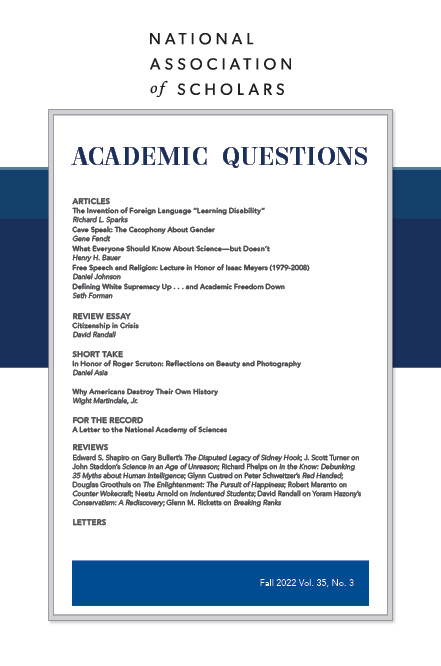Wight Martindale, Jr. has been an adjunct professor in the Honors Program at Villanova University; [email protected]. A former vice president at Lehman Brothers, he is the author of Inside the Cage: A Season at West 4th Street’s Legendary Tournament (Simon and Schuster, 2005) and Don Quixote Goes to College: From the Trading Floor to the Classroom, A Memoir on Education (privately printed, 2013). He last appeared in these pages with “The New Gilded Age: We’ve Seen It All Before,” (Fall 2021).
There are many reasons Americans destroy their own history. Here are four:
(1) Marxist historians always do this; they have a theory about the working man’s revolt which they relentlessly apply to all situations and all countries no matter what. They have defined Russian culture and they produced a wave of otherwise excellent historians in England, including E. P. Thompson and Christopher Hill. But England is also loaded with traditionalists and they, like the French, will never let their histories disappear completely.
(2) America was created in the Age of Enlightenment which dominated all European culture. Voltaire and Rousseau in France, Kant in Germany, John Locke in England. Reason and empiricism, not tradition, was to guide us. Most of America's Founding Fathers would have laughed (or done worse) if someone was stupid enough to suggest that they were not Christians, and they believed that religious faith and practice were essential for ordered liberty. But the Constitution was written just after the first Great Awakening when the religious impulse was at a low-ebb, and the actual wording of the document reflected the Enlightenment zeitgeist of the time. Thus, the scientific method was in, the rituals of religion and its accompanying Christian poesis was out. Ideas were circulated through scientific academies, literary salons, and Masonic lodges. Thomas Jefferson and Benjamin Franklin were great examples of Enlightenment practice in America—the first was philosophical, the second was pure Adam Smith. Thomas Paine called his great tract “Common Sense,” and his timing was perfect.
(3) America has little history; we are a relatively new country. As Henry James told us in 1907 (The American Scene), we are a country with no sovereign, no court, no aristocracy, no national church, no palaces, no castles, no manors, no thatched cottages, no ivied ruins, no little Norman churches, no Eton, no Oxford, no Ascot, and no Epsom.
So radicals and reformers tear down old statues—Christopher Columbus or Robert E. Lee, what does it matter? We remove as national holidays our two most important presidents, George Washington and Abraham Lincoln; the only man left standing now is Martin Luther King Jr. American History becomes American Studies (if it exists at all), and English and American literature (which have important beginnings, middles, and twentieth century periods) become Language Arts—that is, they vanish as revealing, stylistic, and intellectual developments to learn from. Much modern religious expression recalls Doonesbury’s pastor of “the church of what’s happening now.”
(4) The great enemy of history is the lust for power. The Czech writer Milan Kundera tells us that the same boulevard was renamed five times as the Nazis, the nationalists, the Russians, then the nationalists successively took control of his country. History is re-written to establish the legitimacy of whoever happens to be in charge. This always happens after a revolution; it is happening now in anticipation of the revolution to come. Your police are bad guys, my police will be the good guys. . . they will bring order and understanding. From Hitler to Castro to Putin and Xi Jinping—it’s always the same.
And what drives the lust for power? Envy. Our most secret sin. It’s not that society will get any better, but that I’ll be in charge, not you. Cain v. Abel. That’s power. Envy at work.
Real history is not triumphal and it is not simple—it is terribly complicated and there are no easy answers. That is why we should preserve it; that is why it is our best hope for the future.













